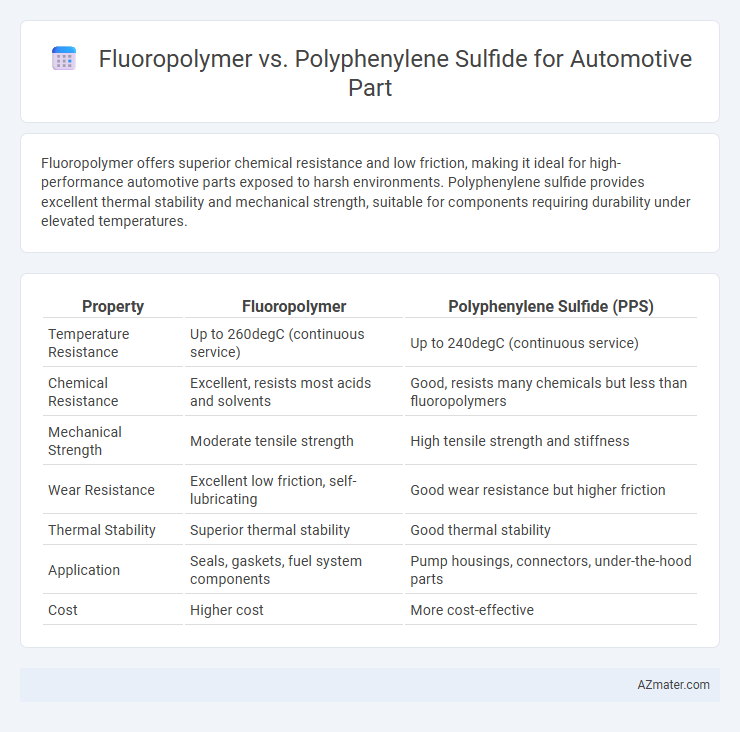Fluoropolymer offers superior chemical resistance and low friction, making it ideal for high-performance automotive parts exposed to harsh environments. Polyphenylene sulfide provides excellent thermal stability and mechanical strength, suitable for components requiring durability under elevated temperatures.
Table of Comparison
| Property | Fluoropolymer | Polyphenylene Sulfide (PPS) |
|---|---|---|
| Temperature Resistance | Up to 260degC (continuous service) | Up to 240degC (continuous service) |
| Chemical Resistance | Excellent, resists most acids and solvents | Good, resists many chemicals but less than fluoropolymers |
| Mechanical Strength | Moderate tensile strength | High tensile strength and stiffness |
| Wear Resistance | Excellent low friction, self-lubricating | Good wear resistance but higher friction |
| Thermal Stability | Superior thermal stability | Good thermal stability |
| Application | Seals, gaskets, fuel system components | Pump housings, connectors, under-the-hood parts |
| Cost | Higher cost | More cost-effective |
Introduction to Fluoropolymer and Polyphenylene Sulfide
Fluoropolymers, known for their exceptional chemical resistance and low friction properties, are widely utilized in automotive parts requiring durability under harsh conditions. Polyphenylene sulfide (PPS) offers high thermal stability and mechanical strength, making it ideal for components exposed to elevated temperatures. Both materials serve critical roles in automotive manufacturing, with fluoropolymers excelling in chemical and weather resistance, while PPS provides structural integrity and heat endurance.
Key Properties of Fluoropolymer
Fluoropolymers exhibit exceptional chemical resistance, high-temperature stability up to 260degC, and low friction properties, making them ideal for automotive parts subjected to harsh environments and mechanical wear. Their excellent electrical insulation and resistance to UV radiation enable long-lasting performance in under-the-hood applications. Compared to polyphenylene sulfide, fluoropolymers provide superior durability and flexibility under extreme thermal and chemical stress.
Key Properties of Polyphenylene Sulfide
Polyphenylene sulfide (PPS) exhibits exceptional chemical resistance, high thermal stability up to 260degC, and excellent dimensional stability, making it ideal for automotive parts exposed to harsh conditions. Its outstanding mechanical strength and low moisture absorption enhance durability and performance in engine components and electrical systems. PPS outperforms many fluoropolymers in structural applications due to its rigidity and inherent flame retardancy without the need for additives.
Thermal Resistance Comparison
Fluoropolymers exhibit superior thermal resistance compared to Polyphenylene Sulfide (PPS), with continuous service temperatures often exceeding 260degC and short-term exposure up to 300degC. PPS typically withstands continuous use around 200-240degC but tends to degrade faster under high thermal stress. This makes fluoropolymers more suitable for automotive parts exposed to extreme heat, such as engine components and exhaust systems.
Chemical Resistance in Automotive Environments
Fluoropolymers exhibit exceptional chemical resistance against automotive fluids such as gasoline, oils, and brake fluids, maintaining stability under high temperatures and aggressive environments. Polyphenylene Sulfide (PPS) offers good chemical resistance but may degrade faster when exposed to certain harsh chemicals and continuous high-temperature conditions found in engine compartments. Fluoropolymers provide superior long-term durability and corrosion resistance, making them ideal for critical automotive parts exposed to aggressive chemical environments.
Mechanical Strength and Durability
Fluoropolymers offer exceptional chemical resistance and maintain mechanical strength under extreme temperatures, making them ideal for automotive parts exposed to harsh environments. Polyphenylene Sulfide (PPS) provides superior dimensional stability and high tensile strength, ensuring durability and resistance to deformation under mechanical stress. For automotive applications requiring long-term wear resistance and structural integrity, PPS generally outperforms fluoropolymers in mechanical strength while fluoropolymers excel in resistance to chemical degradation.
Cost Efficiency and Material Availability
Fluoropolymers offer superior chemical resistance and thermal stability for automotive parts but come with higher raw material and processing costs compared to polyphenylene sulfide (PPS). PPS provides excellent mechanical strength and dimensional stability at a lower price, making it a cost-efficient choice for mass production in automotive manufacturing. Material availability favors PPS due to its broad industrial use and established supply chains, whereas fluoropolymers face limited suppliers and longer lead times, impacting overall cost efficiency.
Applications in Automotive Components
Fluoropolymers offer exceptional chemical resistance, low friction, and high-temperature stability, making them ideal for seals, gaskets, and fuel system components in automotive applications. Polyphenylene Sulfide (PPS) provides excellent mechanical strength, dimensional stability, and resistance to hydrocarbons, widely used in under-the-hood parts such as connectors, pump components, and valve bodies. Both materials enhance durability and performance in automotive components but are selected based on specific requirements for thermal endurance, chemical exposure, and mechanical load.
Environmental Impact and Sustainability
Fluoropolymers exhibit exceptional chemical resistance and durability but pose environmental challenges due to their persistence and difficulty in recycling, raising concerns about long-term ecological impact in automotive applications. Polyphenylene sulfide (PPS) offers a more sustainable alternative with a lower carbon footprint and better recyclability, contributing to reduced waste and energy consumption during production. The choice between fluoropolymers and PPS in automotive parts increasingly hinges on balancing performance requirements with environmental regulations and sustainability goals.
Selecting the Right Material for Automotive Parts
Fluoropolymers offer exceptional chemical resistance, low friction, and excellent temperature stability ideal for automotive components exposed to harsh environments and aggressive fluids. Polyphenylene Sulfide (PPS) delivers high mechanical strength, dimensional stability, and flame retardancy, making it suitable for under-the-hood parts requiring enduring thermal and mechanical performance. Selecting the right material depends on specific application demands such as temperature range, chemical exposure, and mechanical stresses, where fluoropolymers excel in chemical durability and PPS in structural integrity and thermal resistance.

Infographic: Fluoropolymer vs Polyphenylene Sulfide for Automotive Part
 azmater.com
azmater.com